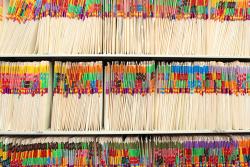 Electronic Health Records is a term which is being chanted more often than ever in the United States. Through the 2009 Health Information Technology for Economic and Clinical Health Act, the US has spent over $30 billion on EHRs. Are these EHRs really worth the investment?
Electronic Health Records is a term which is being chanted more often than ever in the United States. Through the 2009 Health Information Technology for Economic and Clinical Health Act, the US has spent over $30 billion on EHRs. Are these EHRs really worth the investment?
 Electronic Health Records is a term which is being chanted more often than ever in the United States. Through the 2009 Health Information Technology for Economic and Clinical Health Act, the US has spent over $30 billion on EHRs. Are these EHRs really worth the investment?
Electronic Health Records is a term which is being chanted more often than ever in the United States. Through the 2009 Health Information Technology for Economic and Clinical Health Act, the US has spent over $30 billion on EHRs. Are these EHRs really worth the investment?
Going digital is in itself a cost saving option when compared to keeping written records. With EHR, a patient’s entire medical history is saved in a database, and the need for paper documents and their expensive storage is almost eliminated. We know that doctors earn in minutes and they are usually unable to remember the medical history of all their patients. When the patient data is provided digitally, it makes the office workflow easier and convenient.
Even for a patient, it is much easier to meet a practitioner who has a fair idea about the patient’s medical history without having to explain every minute detail. This saves invaluable time. Also, EHRs help practitioners analyze their patients faster, bringing down the time of diagnosis.
Experts have estimated that EHR can save anywhere between $100 -200 per year per patient when compared to traditional methods. There are many other reasons why EHR is more helpful than the traditional method of using paper and pen. Listed here are the few important ones:
As per the research group RAND, when EHRs are implemented across the industry, a total savings of over $100 billion could be made in the coming 10 years.
With EHRs in place, the chances of dosage and medical errors are eliminated. As the medical history is easily accessible, doctors can keep a track of the existing dosage and also be cautious about the allergies and medical intolerances of the patient.
The digital chart also helps in removing any kind of duplications and repeat diagnoses. Presently over $50 billion a year is wasted because of duplicate diagnoses and wrong medications. If done right, this could be the amount that is saved every year through EHR.
When the patient details are available through an EHR, questions like whether the patient is covered by his insurance agency for the recommended treatment or not are answered even before the patient has his first appointment with the doctor.
EHRs could be used as ready referrals by the doctors to understand the patient as well as the ailments.
Through an EHR, an electronic medical prescription could be directly sent to the pharmacies which can bring down the risk of misunderstanding illegible handwritings.
You don’t need to scan the entire office for a missing document when EHR is in place. All you have to do is click the search button. Files are much easily accessible and search friendly with EHR.
Another mode of saving is from transcription costs. When an EHR is implemented, one can save on transcription costs.
An EHR helps mainly in reducing the waiting time by saving emergency rooms of close to $600 per use.
The new set of medical practitioners are now looking to work with practices that use EHR
Paper offices spend thousands of dollars on secure facilities to store excess patient charts. Once digital, the office space requirements and costs drop significantly.
Along with helping in saving a lot of cost, time, and resources, EHRs also help by saving trees and helping the environment. It is certainly impossible to eliminate the use of paper, but EHRs definitely help in reducing the use of paper/charts in your practice.
(time for EHRs / shutterstock)






